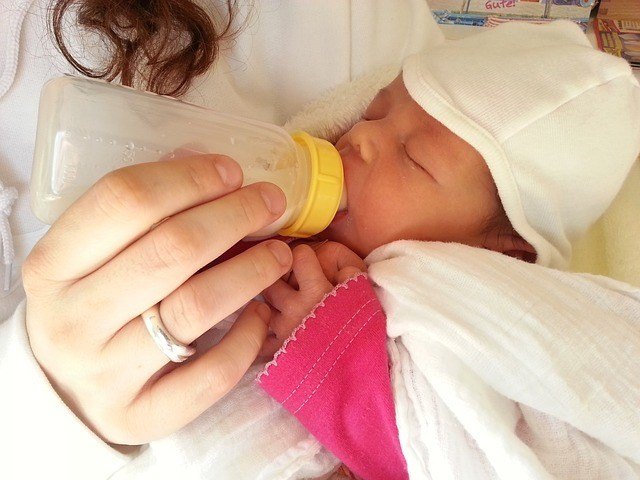If you are a new parent, you might get concerned once you notice milk coming out of baby’s nose. However, this might occur, especially in newborns with a digestive tract that is not yet mature enough to handle large quantities of milk. Let’s find out about the causes and preventions of these incidents.
What is Nasal Regurgitation?
Nasal regurgitation is the movement of ingested milk towards the baby’s esophagus, instead of the stomach. When this happens, fluids or food that is supposed to go to the stomach comes back up to the mouth and nose. This may also be called a spit-up.
Nasal regurgitation is when the spit-up of the baby comes out of the nose instead of the mouth. Moreover, nasal regurgitation may also happen during breastfeeding or bottle-feeding your baby when the flow of milk is more than what your baby can handle during feeding.
Nasal regurgitation may also happen when your baby coughs, sneezes or burp while feeding. Then this happens, milk may come out of the nose instead of the mouth. However, in contrary to vomiting, regurgitation is less forceful and distressing to your baby.
Why is Milk Coming out of Baby’s Nose?
Milk comes out of your baby’s nose because the direction of milk is towards the nose and mouth instead of towards the stomach. Moreover, if you feed your baby too much too quickly, your baby may have difficulty in keeping it down, hence the regurgitation. Babies have a small and immature digestive system when they are born. This is why they have to be fed slowly and carefully during the first few months.
When the milk comes out of the mouth and nose of your baby, it is a tell-tale sign of regurgitation. Moreover, even though your baby may have difficulty at first, it is usually not life-threatening. Some adjustments have to be made to your baby’s feeding routine to avoid further problems.
Is nasal Regurgitation Normal in Babies?
Yes, nasal regurgitation is usually normal for babies 0-3 months old. Moreover, premature babies may also be more prone to nasal regurgitation because of their underdeveloped digestive systems when they are born. Twins and multiples are often born earlier than singletons, so nasal regurgitation might be more common for them during the first few months.
What Causes Nasal Regurgitation?
Nasal regurgitation may be caused by various things. However, there are some causes of nasal regurgitation that you can avoid to ameliorate its effects on your baby. Here are the common causes of nasal regurgitation in newborn babies.
Feeding distractions
When your baby gets distracted in his or her surroundings during feeding, this may cause nasal regurgitation as your baby might not be swallowing the milk as he or she gets distracted by external stimuli and may not be sucking properly.
Too much ingestion of air during feeding
Ingestion of too much air may cause nasal regurgitation as the air rises in your baby’s esophagus and creates resistance to the milk as it is flowing down the stomach. You may reduce this by using a slow feeding bottle or changing your breastfeeding position to limit air intake.
Coughing or sneezing while spitting up, burping or feeding
When your baby coughs or sneezes it forces out air into the nose and mouth. However, when this happens during feeding, spitting up or burping, it may cause milk to flow out of the nose, instead of the mouth.
Immature digestive system
Even after birth, your baby continues to develop his or her internal organs. Moreover, the digestive tract does not immediately mature right after birth, even after several feedings. Premature babies, twins, and multiples may not immediately a mature stomach valve that attaches the oesophagus and the stomach.
When the digestive system is still immature, your baby may not have the ability to hold back excess milk intake that may cause milk to come out of your baby’s mouth and nose. To reduce spit-ups while feeding an infant, proper posture and breastfeeding position is essential. On the other hand, if your baby is formula-fed, you may use a slow feeding bottle to reduce nasal regurgitation while your baby’s stomach is still unable to handle faster-feeding bottles.
You may also feed your baby more frequently in smaller quantities once you notice that spit-ups and nasal regurgitation frequently occurs during feeding. Moreover, if your baby is not yet able to handle larger quantities of milk, you may reduce the amount of milk per feeding and divide it into more frequent feeding times until your baby’s digestive tract can adjust and nasal regurgitation begins to occur less frequently.
How to Prevent Nasal Regurgitation?
There are many ways to prevent nasal regurgitation in babies. However, sometimes, you just need to allow your baby’s digestive system to adjust to the breastfeeding routine or formula milk. Once you are able to determine the cause of nasal regurgitation, you may then be able to prevent it with these measures:
- Follow proper breastfeeding posture and latch positions
- Avoid overfeeding your baby
- Limit milk quantities when feeding to allow your baby’s digestive system to adjust to the feeding routine
- Proper bottle-feeding positions
- Use formula milk with anti-regurgitating ingredients

- Use hypoallergenic formula milk
- Make use of the correct feeding bottles
- Allow your baby to burp even in between feedings
- Stop feeding when your baby is about to sneeze, cough or burp
- Get your baby screened for gastroesophageal reflux disease (GERD)
When you notice milk coming out of baby’s nose, it is probably just normal if your baby is either premature or 0-3 months old. However, you may need to adjust a few things in your feeding routine to alleviate nasal regurgitation in babies. Oftentimes, babies outgrow nasal regurgitation as their digestive system develops. But, if nasal regurgitation persists frequently, you may want to consult your baby’s pediatrician for possible treatment.








 Store
Store